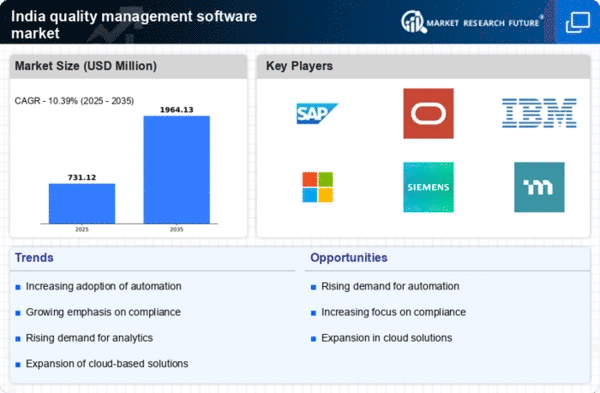Increased Regulatory Compliance
The stringent regulatory environment in India is a significant driver for the quality management-software market. Various sectors, including healthcare and manufacturing, are subject to rigorous compliance requirements set by government bodies. This necessitates the adoption of quality management software that can streamline compliance processes and ensure adherence to standards. For instance, the pharmaceutical industry must comply with the Drug and Cosmetics Act, which mandates strict quality control measures. As a result, organizations are increasingly turning to software solutions that automate compliance tracking and reporting, thereby reducing the risk of non-compliance penalties. The market is expected to witness a surge in demand for such solutions, as companies seek to mitigate risks associated with regulatory failures and enhance their operational integrity.
Emphasis on Customer Satisfaction
In the competitive Indian market, customer satisfaction is paramount, driving the demand for quality management software. Businesses are increasingly aware that high-quality products and services lead to enhanced customer loyalty and retention. As a result, organizations are investing in quality management solutions that enable them to monitor customer feedback and quality metrics effectively. This focus on customer-centric quality management is particularly relevant in sectors such as retail and e-commerce, where consumer expectations are continually rising. The quality management-software market is likely to see growth as companies seek to implement systems that not only ensure compliance but also enhance the overall customer experience. By leveraging software to improve quality, businesses can differentiate themselves in a crowded marketplace, indicating a promising outlook for the industry.
Rising Demand for Quality Assurance
The increasing emphasis on quality assurance across various sectors in India is driving the quality management-software market. Industries such as manufacturing, pharmaceuticals, and food processing are prioritizing quality to meet regulatory standards and consumer expectations. This trend is reflected in the market, which is projected to grow at a CAGR of approximately 12% from 2025 to 2030. Companies are investing in software solutions that facilitate real-time monitoring and reporting of quality metrics, thereby enhancing operational efficiency. The focus on quality assurance not only helps in compliance but also boosts customer satisfaction, which is crucial in a competitive landscape. As organizations strive to improve their quality management processes, the demand for sophisticated software solutions is likely to rise, indicating a robust growth trajectory for the quality management-software market.
Growing Focus on Operational Efficiency
The pursuit of operational efficiency is becoming a central theme for businesses in India, thereby propelling the quality management-software market. Organizations are recognizing that effective quality management can lead to significant cost savings and improved productivity. By implementing quality management software, companies can identify inefficiencies in their processes and implement corrective actions swiftly. This focus on efficiency is particularly evident in sectors like manufacturing, where the adoption of lean practices is prevalent. The market is projected to expand as businesses increasingly seek tools that provide insights into quality performance and facilitate continuous improvement. The potential for software to enhance operational workflows and reduce waste is likely to attract more investments, further driving the growth of the quality management-software market.
Technological Advancements in Software Solutions
Technological advancements are reshaping the landscape of the quality management-software market in India. Innovations such as artificial intelligence (AI) and machine learning (ML) are being integrated into quality management systems, enabling organizations to analyze data more effectively and predict quality issues before they arise. This shift towards predictive quality management is likely to enhance decision-making processes and reduce the incidence of defects. Furthermore, the rise of cloud-based solutions is making quality management software more accessible to small and medium enterprises (SMEs), which previously may have found such tools cost-prohibitive. As technology continues to evolve, the quality management-software market is expected to benefit from increased adoption rates and the development of more sophisticated features that cater to diverse industry needs.
















